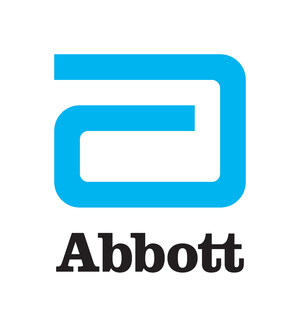- TriClip offers a remarkably safe, minimally invasive treatment option for patients in need of tricuspid valve repair but who are unable to withstand surgery
- More than 1.6 million people in the U.S. are affected by tricuspid regurgitation,1 which can severely impact quality of life
- Data from the TRILUMINATE™ Pivotal trial demonstrated that patients who received TriClip experienced a marked improvement in the severity of their symptoms and quality of life, with benefits sustained at one year
ABBOTT PARK, Ill., April 2, 2024 /PRNewswire/ -- Abbott (NYSE: ABT) today announced that the U.S. Food and Drug Administration (FDA) has approved the company's first-of-its-kind TriClip™ transcatheter edge-to-edge repair (TEER) system that's specifically designed for the treatment of tricuspid regurgitation (TR), or a leaky tricuspid valve. This approval follows the recent recommendation of the Circulatory System Devices Panel of the Medical Devices Advisory Committee for the FDA, whose vote confirmed 13 to 1, with 0 abstention that the benefits of TriClip outweighed the risks.
Experience the full interactive Multichannel News Release here: https://www.multivu.com/players/English/9255151-abbott-receives-fda-approval-for-triclip-device-to-repair-leaky-tricuspid-heart-valve/
"The U.S. approval of TriClip is a significant advancement for people suffering from tricuspid regurgitation, a heart condition that negatively impacts their quality of life and puts them at grave risk of serious health issues," said Paul Sorajja, M.D., the Roger L. and Lynn C. Headrick Family Chair of the Valve Science Center for the Minneapolis Heart Institute Foundation and director of the Center for Valve and Structural Heart Disease for the Minneapolis Heart Institute at Abbott Northwestern Hospital and co-principal investigator of the TRILUMINATE™ Pivotal trial. "With TriClip, physicians can offer patients a therapy option backed by excellent safety and effectiveness to help restore tricuspid native valve performance without subjecting them to high-risk open-heart surgery that may not be feasible for individuals with TR who are generally older and sicker."
The tricuspid valve controls blood as it flows from the heart's right atrium to the right ventricle. TR occurs when the valve doesn't close properly, causing a leak and allowing blood to flow backward in the heart. TR can force the heart to work harder, causing debilitating symptoms such as fatigue and shortness of breath. When left untreated, TR can lead to atrial fibrillation, heart failure, and ultimately, death. For those who continue to have symptoms or persistent TR despite treatment with medical therapy and are not considered good candidates for surgery, TriClip represents an option that can improve a person's quality of life.
Delivered through a vein in the leg, TriClip's TEER technology works by clipping together a portion of the leaflets – or flaps of tissue – to repair the tricuspid valve and help blood flow in the right direction without the need for open-heart surgery. On average, people who receive TriClip only need one day in the hospital before they recover and can return home.
As part of its approval process, the FDA reviewed findings from the TRILUMINATE Pivotal trial, the world's first randomized, controlled clinical study to evaluate the safety and effectiveness of the TriClip system compared to medical therapy in people with severe TR who are at intermediate or greater risk for open-heart surgery. In the study, 90% of patients who received the TriClip system experienced a marked improvement in their TR grade, reducing from severe or higher to moderate or less at 30 days – a reduction that was sustained at one year. The trial also demonstrated a highly favorable safety profile, with 98% of patients being free of major adverse events through 30 days, and a significant improvement in quality of life.
"This approval helps address a treatment gap for people with tricuspid regurgitation who previously had few options to treat a disease that adversely impacted their daily lives and could lead to other deadly conditions," said Sandra Lesenfants, senior vice president of Abbott's structural heart business. "With the addition of TriClip to our broad structural heart therapy offerings in the U.S., we are continuing to bring meaningful, life-enhancing benefits to patients with cardiovascular conditions."
TriClip leverages the same clip-based technology as Abbott's leading MitraClip™ device – which has treated more than 200,000 people with leaky mitral valves (mitral regurgitation) – but was specifically designed to treat the tricuspid valve's complex anatomy.
TriClip has been approved for use in more than 50 countries, including in Europe and Canada, since its initial CE Mark approval in 2020. The device has already been used to treat more than 10,000 people with TR.
Abbott offers the industry's most comprehensive portfolio of structural heart solutions. In addition to TriClip, the company's innovative, minimally invasive therapies include first-of-its-kind technologies MitraClip and Amplatzer Piccolo™ Occluder (to close a hole in the heart of babies), as well as the Navitor™ transcatheter aortic valve implantation system (to treat aortic stenosis). Abbott continues to focus on addressing the unmet needs of patients with structural heart disease and advancing standards of care so people can live their fullest possible lives.
For U.S. important safety information on TriClip, visit https://abbo.tt/TriClip_ISI.
For U.S. important safety information on MitraClip, visit https://abbo.tt/MitraClipISI.
For U.S. important safety information on the Amplatzer Piccolo Occluder, visit https://abbo.tt/PiccoloISI.
For U.S. important safety information on Navitor, visit https://abbo.tt/NavitorISI.
About Abbott
Abbott is a global healthcare leader that helps people live more fully at all stages of life. Our portfolio of life-changing technologies spans the spectrum of healthcare, with leading businesses and products in diagnostics, medical devices, nutritionals and branded generic medicines. Our 114,000 colleagues serve people in more than 160 countries.
Connect with us at www.abbott.com and on LinkedIn, Facebook, Instagram, X and YouTube.
1 Kolte, Dhaval & Elmariah, Sammy. (2020). Current state of transcatheter tricuspid valve repair. Cardiovascular Diagnosis and Therapy. 10. 89-97. 10.21037/cdt.2019.09.11. |
||||||||
SOURCE Abbott

WANT YOUR COMPANY'S NEWS FEATURED ON PRNEWSWIRE.COM?
Newsrooms &
Influencers
Digital Media
Outlets
Journalists
Opted In





Share this article